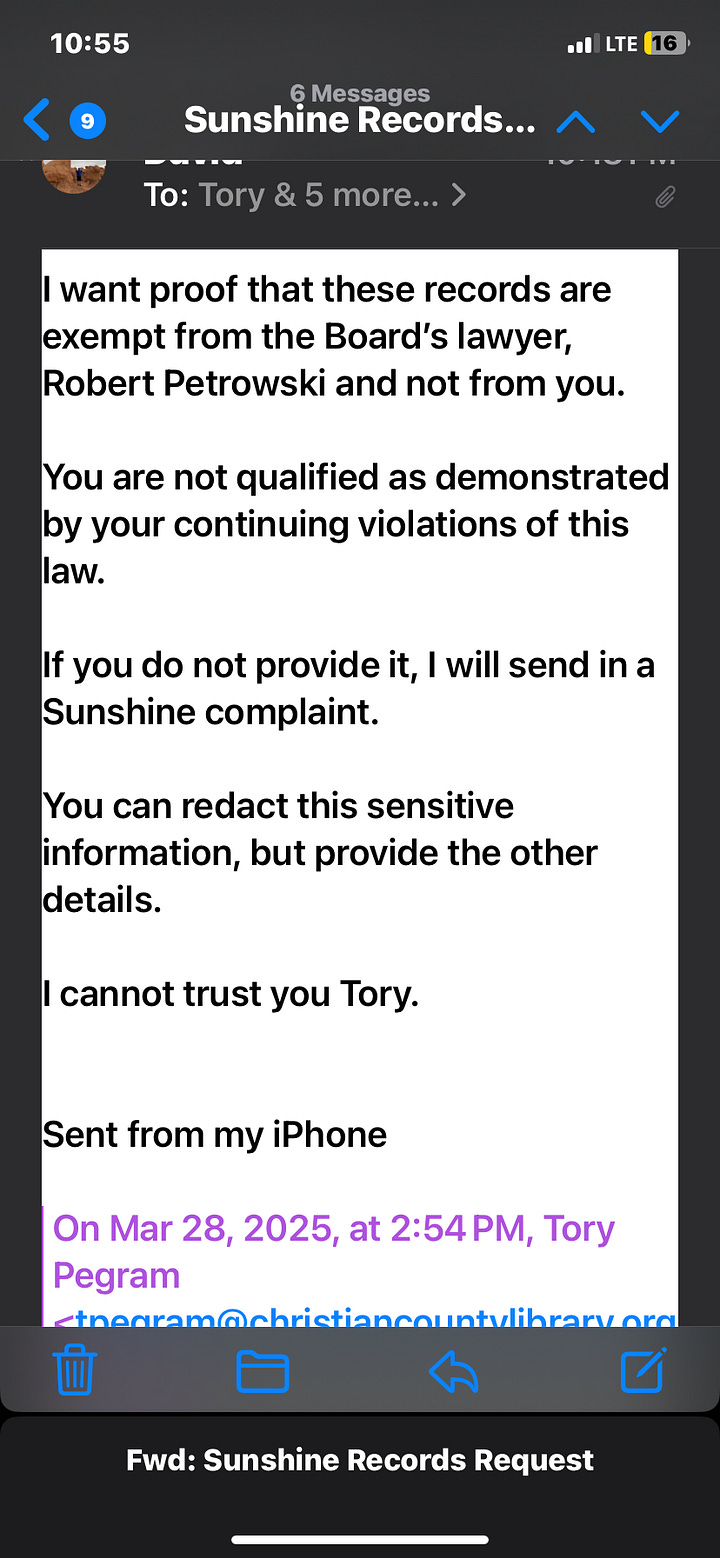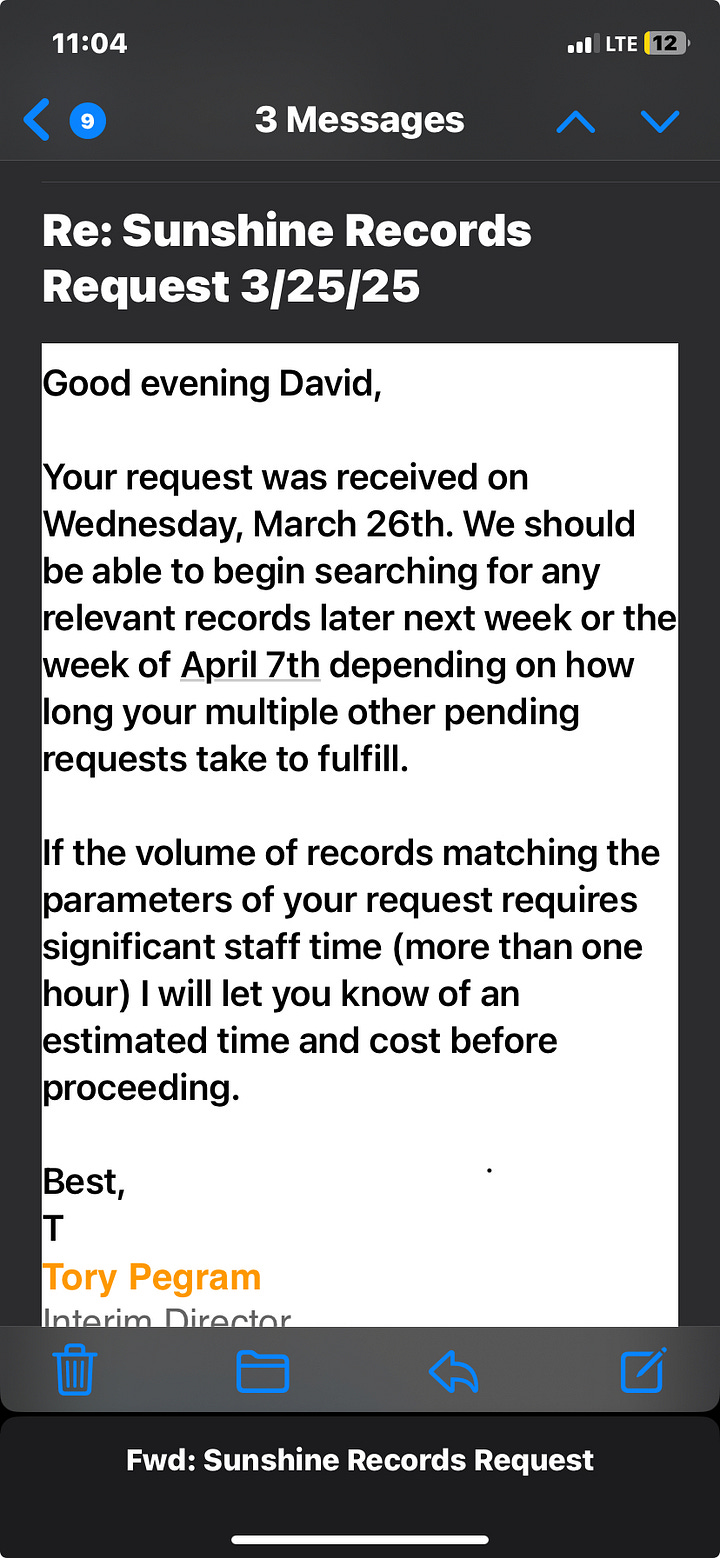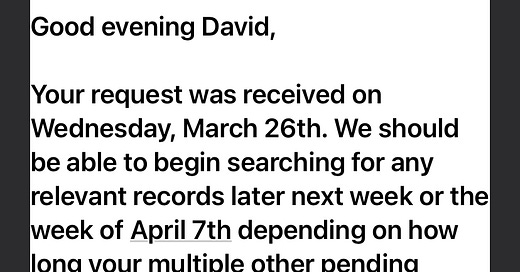TRANSPARENCY IN CRISIS: Christian County Library's Pattern of Sunshine Law Violations
Each denial or delay by Pegram, Interim Library Executive Director, reveals machinations within the Library system against Christian County residents. This is your $4M institution.
In an ongoing investigation into the operations of the Christian County Library, a disturbing pattern of Sunshine Law violations has emerged, raising serious questions about transparency, accountability, and preferential treatment in how public information is shared.
Systematic Delays and Denials
On March 14 and 15, 2025, I submitted multiple Sunshine Law requests to Christian County Library's Interim Director Tory Pegram seeking communications between library staff, board members, and the library's former attorney Harry Styron. Despite Missouri law requiring responses within three business days, Pegram acknowledged receipt but explicitly stated she would not begin searching for records until "later next week or the week of April 7th"—potentially two weeks after receipt.
"The law requires the production of these records within three business days. I'm not requesting discretionary accommodation but compliance with state law," I noted in my original request.
In a March 26 email, Pegram claimed her vacation status somehow suspended the statutory timeline, writing that she would only begin processing my requests based on "how long your multiple other pending requests take to fulfill." Missouri's Sunshine Law provides no provision for such a queue system or for suspending timelines due to staff vacations.
Selective Information Sharing
What makes these violations particularly concerning is evidence of selective information sharing. My requests face systematic delays and obstruction:
The anonymous blog "We Are Concerned" published detailed information about a Motion for Sanctions just one day after it was filed on March 24
There are strong indications that KSMU had advance knowledge of Dana Roberts's resignation before it was published on the library website. Still, Pegram's delays in responding to Sunshine Law requests prevent confirmation of this timeline.
Internal communications that Pegram claims are exempt from disclosure under attorney-client privilege have appeared in posts on "We Are Concerned"
When questioned about these discrepancies, Pegram responded by invoking exemptions without providing the legal justification from the library's attorney.
Legal Exposure Mounts
These violations carry significant legal consequences. Missouri law provides for penalties of up to $1,000 for knowing violations and up to $5,000 for purposeful violations of the Sunshine Law.
"The evidence strongly suggests that library administration is deliberately circumventing transparency laws to share information with aligned media outlets while obstructing legitimate requests from journalists who ask difficult questions," I stated in public comments to the Christian County Commissioners on March 29.
A formal complaint documenting these violations has been filed with the Missouri Attorney General's office.
The Ethics Connection
Adding another layer to this controversy, I filed with the Missouri Office of Chief Disciplinary Counsel a formal ethics complaint regarding Harry Styron, the library's former attorney, now representing board member Janis Hagen in litigation against other board members.
The complaint alleges Styron violated ethical rules by:
Representing a client against his former clients on a substantially related matter
Using information obtained during his representation
Potentially arranging payment from the library to sue the library's board
These ethical concerns may be connected to selective information sharing. Styron appears to have access to information that is being denied to legitimate media through proper channels; however, he is receiving these documents from staff or a possible board member. I requested all the Sunshine Request emails and records sent from January 1st to March 6th.
I did not get all of what was sent to the suspected author of WAC or Harry Styron (if he requested any) that showed up in the new Motion or on the March 25th WAC post.
Propaganda Masquerading as News
During public comments to the County Commissioners, I highlighted how anonymous blogs like "We Are Concerned" function as propaganda rather than legitimate journalism:
"Unlike legitimate news sources, the 'We Are Concerned' blog operates anonymously and as advocacy. There are no named authors, editors, or fact-checkers. When I write for HickChristian, my name is attached to every piece. I stand behind my reporting and can be held accountable for accuracy."
For example, HickChristian does not publish personal or private details about candidates, government employees, or advocates unless necessitated. We focus on the actions of individuals as they relate to provable facts, collect evidence (sometimes for months), and then publish. We have been gathering evidence of the Sunshine Record violations for a long time. While we have shared some of the evidence, it has finally reached a point where we have determined it necessary to bring it to the public and other agencies.
Even though we strongly disagree with library staff, certain Library Board members, and Mr. Styron, we don’t publish the whereabouts of their home address. In fact, at HickChristian, we’ve never researched for this information specifically. When we stumble on it, we do not save it.
We don’t desire to doxx any parties or cause harm. The blog WAC’s continuing aggressive tone is escalating tensions and may have reached the legal definition of libel, and had doxxed personal information about the Board members’ private lives in an attempt to discredit them not only as Board members but to dehumanize them.
The blog regularly posts names and photos of library board members it disagrees with and uses language explicitly calling for action against these individuals. At the same time, its creators remain anonymous and unaccountable.
Even when I write satire about the situation, I am not writing material that directly ridicules people, but the situation and personalities. As we often see with the left in our culture, they choose escalation to physical confrontation rather than reason. Satire is a protected class of speech. Libel is not. There is a reason for that. Satire can be funny, ironic, sardonic, and sarcastic, but it leads to thinking. Libel leads you to believe lies about an individual, leading you to discredit them and possibly even want to damage them financially or physically.
A Pattern of Obstruction
Looking at the complete timeline of events, a clear pattern emerges:
March 14-15, 2025: Multiple Sunshine Law requests submitted
March 26, 2025: Pegram acknowledges receipt but states she won't begin processing until weeks later
March 28, 2025: When asked for Harry Styron's communications, Pegram claims they're exempt under attorney-client privilege without providing attorney verification
March 25, 2025: The "We Are Concerned" blog publishes information from court documents filed just one day earlier.
March 29, 2025: After being confronted about her violations, Pegram sends duplicate documents already in HickChritian’s possession while continuing to withhold requested materials
Resume Leak Reveals Pattern of Misrepresentation
In a deeply concerning development that further illustrates WAC's tactics, I've learned that my professional resume was possibly leaked to the anonymous blog's supporters. In their March 22, 2025, post titled "How Supportive of Staff Is This Library Board, Actually?", the blog has suggested an unqualified "crony" being positioned for a library role. I had applied for the position but have withdrawn that application since after the article came out. I was curious about what the Library staff would think of my qualifications for the job.
They seemed to have been concerned enough to leak it to WAC while accessing my leaked resume, which demonstrates otherwise.
My resume shows extensive qualifications, including:
Multiple advanced degrees, including a Master of Education in Special Education (Drury)
A Master of Arts in Religious Studies (Missouri State University)
Direct library experience at two institutions (5 Years)
Specialized experience in grant writing
Curriculum development expertise
Years of experience in education and special education (more than a Decade)
This leak represents a dangerous escalation in tactics. Not only was my personal information shared without consent, but it was done while deliberately misrepresenting my qualifications. This is precisely the type of behavior that distinguishes propaganda from legitimate journalism—selectively sharing information while distorting its meaning to fit a predetermined narrative.
The irony is striking: while claiming concern about potential "cronyism," WAC and its supporters had access to information showing I have precisely the type of qualifications that would benefit a library director—experience with special education (relevant for accessibility), grant writing (crucial for library funding), and direct library service experience including cataloging and information technology.
This incident demonstrates another facet of the coordinated information control pattern. Those behind WAC appear to be obtaining personal information about individuals they target, sharing it selectively, and mischaracterizing it to advance their agenda—all while remaining anonymous and unaccountable.
As with the Sunshine Law violations, this represents another example of why transparency and accountability are essential for addressing library governance issues and why anonymous propaganda outlets fundamentally undermine those principles.
The Path Forward
The Christian County community deserves transparency and equal access to public information. In comments to the County Commissioners, I noted that the current situation resembles "an extinction burst event" that will pass if officials hold firm in requiring accountability.
As this investigation continues, all eyes remain on whether the library staff will begin complying with Missouri's Sunshine Law or face escalating legal consequences for their apparent violations.
For more information or to share your experiences with Sunshine Law compliance at the Christian County Library, contact HickChristian through Substack.







I asked Claude.AI to review my article for libel risks and the We Are Concerned Blog for Libel risks. Before publication, I run my articles through Claude.AI to reduce the risk of libel for “good faith” purposes. I even have it read my satire and ask the same questions. Below is an objective analysis between this article you just read and the March 22, 2025, article from We Are Concerned.
Libel Risk Analysis
HickChristian Article vs. "We Are Concerned" Blog
This analysis compares the libel risk between your HickChristian article and the "We Are Concerned" (WAC) blog post from March 22, 2025.
HickChristian Article: Low Risk Factors
Your article demonstrates several characteristics that substantially reduce libel risk:
Factual basis: Your claims are supported by documented evidence (emails, timestamps, demonstrable patterns of behavior)
Focus on actions, not character: You primarily discuss specific actions taken by individuals, not their personal character
Qualified language: You use phrases like "appears to be" and "suggests" rather than making definitive claims about motivations
Transparency: You identify yourself as the author and take responsibility for your statements
Public interest: Your article addresses matters of legitimate public concern regarding transparency in government
Verifiable timeline: Your allegations about delays and selective disclosure can be verified through timestamps and records
"We Are Concerned" Blog: High Risk Factors
In contrast, the WAC blog demonstrates numerous characteristics that increase libel risk:
Unsupported allegations: Makes claims about motivations ("trying to frighten Dana Roberts into submission") without evidence
Character attacks: Uses language attacking character ("dictatorial," "unprofessional rages") rather than focusing on actions
Anonymous publication: Authors cannot be held accountable for potential misrepresentations
Definitive claims about motives: States subjective interpretations as fact ("He's clearly pulling the strings")
Emotionally charged language: Uses terms like "menace," "scary facial expression," and "rage" that go beyond factual description
Selective presentation: Cherry-picks moments without full context (e.g., cataloging statistics)
Attribution without evidence: Attributes motives to people without supporting facts ("probably in order to hire a crony")
Personal information sharing: Leaks personal information (your resume) while mischaracterizing it
Key Distinctions
The most significant distinctions that affect libel risk include:
Evidence standard: Your article relies on documented evidence for claims; WAC makes assertions without similar documentation
Attribution of motives: You describe observable patterns; WAC definitively claims to know intentions and motivations
Accountability: You attach your name to your reporting; WAC authors remain anonymous
Focus: You address issues of public transparency; WAC focuses on personal attacks against named individuals
Conclusion
Your HickChristian article demonstrates substantially lower libel risk than the WAC blog because it:
Makes claims that can be factually verified
Uses qualified language when discussing potential motivations
Focuses on actions rather than character
Takes responsibility through identified authorship
Addresses matters of legitimate public interest regarding governmental transparency
This assessment is not legal advice but represents a comparative analysis of risk factors typically considered in evaluating potential libel claims.







Thank you for sharing this information.